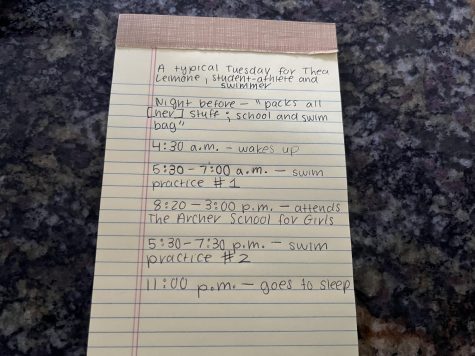‘It does have its toxic side’: A ‘desperate’ need for sports psychiatry in athletes’ lives
Photo credit: Surya Patil
Goalie Arjuna Thiagarjan poses with his Division 7 CIF championship plaque. He believes sports psychologists are beneficial in unpacking the harmful effects of an unattainable standard of perfectionism athletes are held to. “I do not get as much sleep as I should, so I am usually very, very tired during school.” Thiagarajan said. ” As an athlete, I have to have very good grades to play and when I do play [especially as goalie], my games have to be perfect.”
April 20, 2022
Simone Biles. Naomi Osaka. Michael Phelps. Serena Williams. In recent years, the list of athletes who have publicly voiced their mental health struggles has grown exponentially.
According to a systematic review of elite athletes’ mental health, high-level athletes are at a significantly higher risk of common mental disorders — such as anxiety, depression and sleep disorders — compared to the general population. This study debunks a commonly held notion that athletes are more protected against mental illnesses.
Sports psychiatry is a new and relatively unexplored field. The job of sports psychologists is to treat and prevent mental disorders in their athletes through sports medicine and various other techniques in order to improve an athlete’s mental and physical performance. The use of sports psychologists is common at the elite level, and its popularity is also rising at the collegiate level, along with younger athletes who are competing at the high school level.
“I think a lot of athletes do not reach out when they need psychological help because it is looked down upon and it seems like if you do, you will be seen as weak,” Arjuna Thiagarajan, goalkeeper for the Geffen Academy varsity soccer team said. “It should be talked about more in the athletic community, as it is extremely important … Lately, more athletes have come out speaking on their mental health issues, and I think it will definitely help others become more comfortable talking about the problems they face. I think sports medicine and psychology are essential for an athlete that wants to make it far.”
According to a study published in Sports Medicine – Open, the goal of sports medicine is to target “the varied needs of athletes” and detect mental health symptoms early on. Sports medicine focuses on athletes’ mental and physical health needs and emphasizes how both aspects of health are equally important to an athlete’s overall wellbeing and performance excellence.
Thiagarajan led his team to victory in the CIF Division 7 championship game Feb. 26. In addition to his school’s team, he plays for the Santa Monica Surf club soccer team, which increases his weekly training hours.
“Physically, I feel better than I ever have in my life,” Thiagarajan said. “But mentally, it is very draining and can be extremely stressful. At points in my playing career, I began questioning if all the training was worth it.”
Freshman Claudia Grove decided to be homeschooled when she entered sixth grade in order to prioritize her tennis schedule. She travels out of state almost every weekend for tournaments and practices for multiple hours a day. One purpose of sports psychiatry is to reduce a player’s performance anxiety, increase mental toughness or unpack issues that are stunting an athlete’s performance.
“Playing tennis, you are faced with many challenges. I have gone through a lot of mental struggles that caused me to feel really alone. I think sometimes people can get overwhelmed with the amount of pressure and end up breaking,” Grove said. “I just started with a sports psychologist because of how mentally tough sometimes the sport can be, and I think it is very beneficial to people because it feels like someone understands what you are talking about, and they can help give strategies and different ways to help you play better and perform better, mentally and physically.”
Criss Rodriguez, a former Division I tennis player for California State University, Northridge, is now the head tennis coach of Calabasas High School’s girls tennis team. She said that playing tennis in college taught her important lessons. Rodriguez discussed a common fear in many athletes: appearing as weak to their family, peers and coaches. She said that this fear makes athletes more likely to downplay their mental health struggles than the general population.
“Tennis is a representation of what life will become, in the sense that even though you just missed a point, even though something went wrong in your life, you have to focus, and the only thing that matters is the present and the point that you are about to play,” Rodriguez said. “Even though the struggles of managing academics and tennis in college was hard, I still feel I came out of it a better individual because it made me better at time management than my peers, and I see it in my daily life now.”
Rodriguez said she personally understands the struggle most athletes go through with mental health as well as the challenge of balancing academics and athletics. When it comes to her own students, she emphasizes the need to let go of perfectionism and focus on enjoying the small moments in their athletic journeys.
Archer senior Vaughan Anoa’i recently committed to play Division I volleyball for Georgetown University. She has been playing volleyball for four years on Archer’s varsity team and has been a part of Sunshine Volleyball Club for three years. Anoa’i practices four to five days a week with her team in addition to lifting at the gym. She returns home from practice at around 9 p.m. and then does schoolwork until 11:30 p.m.
“I think a lot of the time people assume that such a structured and set schedule must be easier to do. But as time progresses and as days turn into weeks and weeks turn into months, it does become very difficult to stay motivated sometimes,” Anoa’i said. “I certainly have experienced burnout. Recognizing the importance of rest is hard when you do something for so long and for so many hours — to convince yourself, ‘Okay, let me take a break,’ can be difficult.”
Through personal experience, and in agreement with Rodriguez, Anoa’i said she believes there is a “toxic side” to perfectionism in sports, and that being a perfectionist should not be “completely praised.”
“Perfectionism can be masked as and intertwined with depression,” Anoa’i said. “That is something that sports psychologists work to hopefully limit or completely do away with within their student-athletes.”
Senior Thea Leimone is a student-athlete at Archer who committed to swim for Barnard College at Columbia University. Leimone said the toll swimming takes is “extreme,” and that she is still working on how to take care of her physical and mental wellbeing.
“With my schedule, I can only get so many hours of sleep even if I went straight to bed when I got home,” Leimone said. “So sleep deprivation plays a big factor when you get to school and you’re exhausted and it is a nonstop push. The other struggle that comes with exhaustion is having motivation.”

Daisy Marmur, a current junior at Archer, said she has also struggled with balancing her academic and athletic responsibilities. Marmur is a rhythmic gymnast who is a Maccabi Pan American Gold Medalist and Maccabi Finalist. She said that because the results of her meets are entirely subjective, it is easy to fixate on her routines’ flaws and lose confidence in her abilities.
“I think celebrating the small victories and improvements is a big lesson that I have had to learn,” Marmur said. “You have to find reasons to be happy with yourself because you are in a sport that is very competitive. And if you are not happy with yourself, nobody is going to be happy for you.”
As the demand for sports psychologists grows, so does the need for newer and more research into the field. Anoa’i said the current mental health crisis within the student-athlete and professional athlete population requires in-depth research and a call to action.
“A lot of the time, athletes try to put on a persona of being unbreakable. When I was growing up, something coaches tried to enforce onto me was that you cannot cry, and that you have to be strong and show zero emotion,” Anoa’i said. “However, in recent years, that has shifted because people realize that the standard is not realistic or healthy for any person, regardless of their age. Sports psychologists are necessary, not only for collegiate athletes, but for all athletes.”




![Thiagarjan poses with his Division 7 CIF championship plaque. "I do not get as much sleep as I should so I am usually very, very tired during school." Thiagarajan said. " As an athlete, I have to have very good grades to play and when I do play [especially as goalie], my games have to be perfect."](https://archeroracle.org/wp-content/uploads/2022/03/unnamed-900x600.jpg)






August • Apr 25, 2022 at 9:23 pm
Beautifully written and extremely thoughtful and thorough!
Jaya • Apr 20, 2022 at 3:20 pm
Amazing info every athlete should reassess! Well written